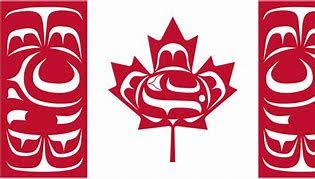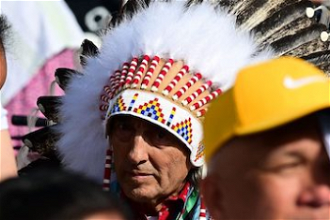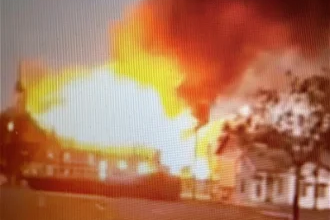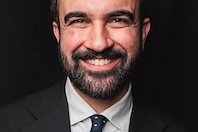Calls for Church to apologise for Canadian Indian residential school abuse

Survivors of historic neglect and abuse in Canada's Indian Residential Schools say they are not satisfied by Pope Francis's recent expression of sorrow. The Federation of Sovereign Indigenous Nations is seeking a formal apology on behalf of the Catholic Church. On Sunday, the Pope said the Church is "humbly" committed to "a path of reconciliation and healing." However, Canada's Ministry for Crown-Indigenous Relations said the Pope's remarks did not go far enough. There are growing calls for the schools' codex historicus (records of daily life), correspondence and photographs to be shared.
It is feared that as many as 6,000 of the 150,000 indigenous children taken from their families between 1870 and 1996 may have died as a consequence of malnutrition, disease and assault. Maltreatment at the schools has been public knowledge in Canada for decades, leading to the establishment of the Truth and Reconciliation Commission in 2008. However, the recent discovery of a mass grave of 215 children, some as young as three, at Kamloops Indian Residential School in British Columbia prompted Prime Minister Justin Trudeau to call for a Papal apology. Since then, thousands of pairs of children's shoes have been left on the steps of Catholic churches across Canada in make-shift shrines.
Church entities ran 60% of the schools on behalf of the Canadian government. More than 130 schools were established with the aim of erasing indigenous culture or links with the children's families. While the Anglican, Presbyterian and United churches have apologised, the Canadian Conference of Catholic Bishops has stopped short of apologising or handing over records, saying that the Church in Canada is decentralised. In a statement to the Globe and Mail newspaper, the Conference denied responsibility. "The Catholic Church as a whole in Canada was not associated with the Residential Schools, nor was the Canadian Conference of Catholic Bishops." It said that 16 of the 70 Canadian dioceses and three dozen religious communities were associated with the schools, but that each was "corporately and legally responsible for its own actions."
The Globe and Mail reports that Catholic entities had a financial obligation to pay $25 million Canadian dollars as part of the residential schools' settlement for survivors' healing and reconciliation programmes but only $3.7 million was raised. The Truth and Reconciliation Commission has taken legal action to obtain records but many have still not been shared.
Former senator Murray Sinclair who chaired the Commission took testimony from survivors who told of children being buried in large numbers, and of friends who suddenly went missing from the institutions. In a video message, Sinclair said that since the discovery of the mass grave, he had been inundated by messages from survivors saying to him, "I told you this had happened," expressing anger that no one had believed them. There was also the painful realisation, Sinclair said, that friends whom they hoped had escaped were probably dead.
According to testimony given to the Commission, babies resulting when priests abused indigenous girls were confiscated and, in some cases, disposed of in furnaces. Reports allege children were also the subject of experiments, being deliberately starved to study the effects of malnutrition. Survivors of St Anne's school in Fort Albany, Ontario, allege that they were whipped, beaten, and subjected to widespread sexual abuse and punishment by electric shocks.
Sinclair predicted that more mass graves would be found. As his commission weighed the evidence, they asked the Canadian government of Prime Minister Stephen Harper to allow a fuller enquiry which could force the churches to hand over the relevant documents. Their request was denied.
Mary Ellen Turpel-Lafond, the director of the Indian Reservations School History and Dialogue Centre at the University of British Columbia, told the CBC she was shocked that a senior archbishop interviewed by the CBC's "Ottawa Morning" programme professed ignorance of the abuse and the cover up. "They've been in courts for years, fighting the survivors," she commented.
Ottawa-Cornwall Archbishop Marcel Damphousse told the CBC he needed to "educate himself" about what had happened in the schools. He said, "The whole church is suffering….Some of those students were Catholics."
Responding to the archbishop's words, Turpel-Lafond pointed out that survivors had been speaking about their experiences for decades, and there had been 30 major prosecutions. She said there was frustration that survivors had been unable to access the church's records. She called for criminal investigations to arrive at the truth.
The Truth and Reconciliation Commission's "Calls to Action" contains 94 recommendations including the need for action on child welfare, health, language and cultural matters, justice and reconciliation. It is widely accepted that damage suffered by the children has been passed down to their own offspring.
On a personal note:
It was a Canadian prime minister, Lester Pearson, who got Apartheid South Africa kicked out of the Commonwealth. Canada has provided leadership in peacekeeping missions around the globe, and its diplomats have been the architects of important measures such as the landmines treaty and the Responsibility to Protect doctrine.
While the USA had Richard Nixon, Watergate and the Vietnam War, Canada had Pierre Trudeau and flower power. While Donald Trump was branding Mexicans as rapists and drug pushers, Canada had Pierre Trudeau's son, Justin, personally welcoming Syrian refugees as they got off planes, giving them warm coats.
Yet, as my generation of Canadians enjoyed the post-war boom, peace, stability and unimaginable plenty, children of the Inuit and Metis ethnic groups were being removed from their families and shipped to schools far away. Their hair was cut, all personal belongings were removed, they were forbidden from speaking their native tongue, and they had little or no contact with their families. They grew up without love or attention, surrounded by a system aimed at eliminating their culture and memories of home.
Canadians are looking to Pope Francis to ensure that the Catholic Church in Canada cooperates with criminal enquiries, hands over documents and participates in reconciliation efforts. Inevitably, an apology and the admission of historic responsibility will be part of that process.
The National Indian Residential School Crisis Line is available to provide support to those affected by this issue. You can access emotional and crisis referral services by calling the 24-Hour National Crisis Line at 1-866-925-4419.


















